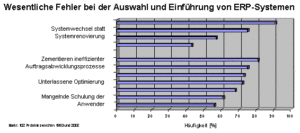Common weaknesses in selection and implementation
If you don’t want to make any mistakes when selecting and implementing an ERP (Enterprise Resource Planning) system, you can check your decision using the negative hit list from management consultants Abels & Kemmner.
The Herzogenrath-based company evaluated 102 ERP consulting projects and quantified the most common sources of error. For example, 90% of the companies surveyed did not compare the ERP systems in question in terms of their cost/benefit ratio.
This is one of the reasons why in 80% of cases inefficient order handling processes were “cemented” and systems with too much complexity were installed. Experience shows that only 15% of the available and paid-for functionality in ERP systems is actually used. A review of this decision by external specialists is therefore highly recommended.
However, the reality is that over 2/3 of users either do not consult a neutral consultant at all when selecting an ERP system, or they consult the system house itself or management consultancies with system specialization. However, no entrepreneur can arrive at a truly objective cost-benefit analysis with such decision-making processes – but this should be a matter of course for an investment that often runs into six figures, even in SMEs.
Abels & Kemmner recommends that the first thing to do is to design future rational organizational processes. Based on this, a company should select suitable ERP systems in an initial selection stage. In a second selection stage, these were to be examined more closely on the basis of our own data. The functionalities must also be evaluated from a cost-benefit perspective before a decision can be made that also makes economic sense.
Info
Dr. Götz-Andreas Kemmner, Abels & Kemmner Gesellschaft für Unternehmensberatung mbH, Kaiserstr. 100, 52134 Herzogenrath, Tel. 02407/9565-0, Fax -40, E-Mail:
AKemmner@ak-online.de
, Internet:
ak-online.de



